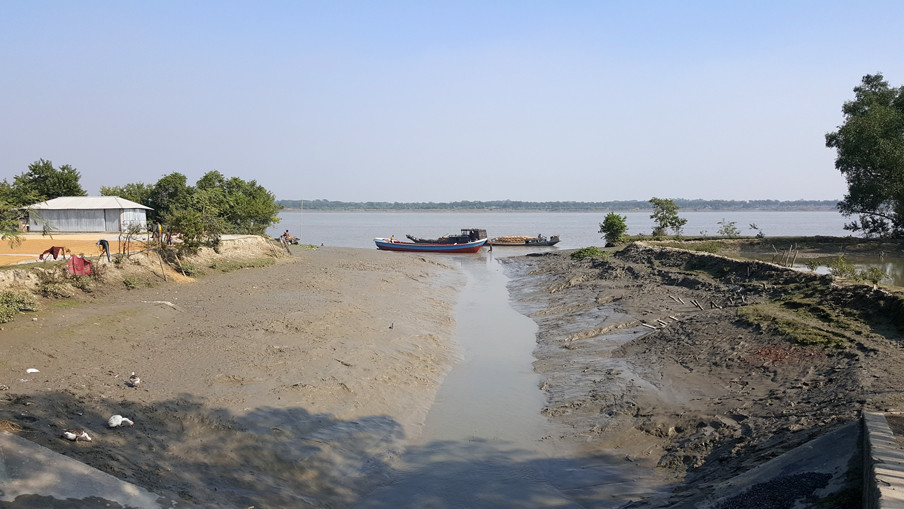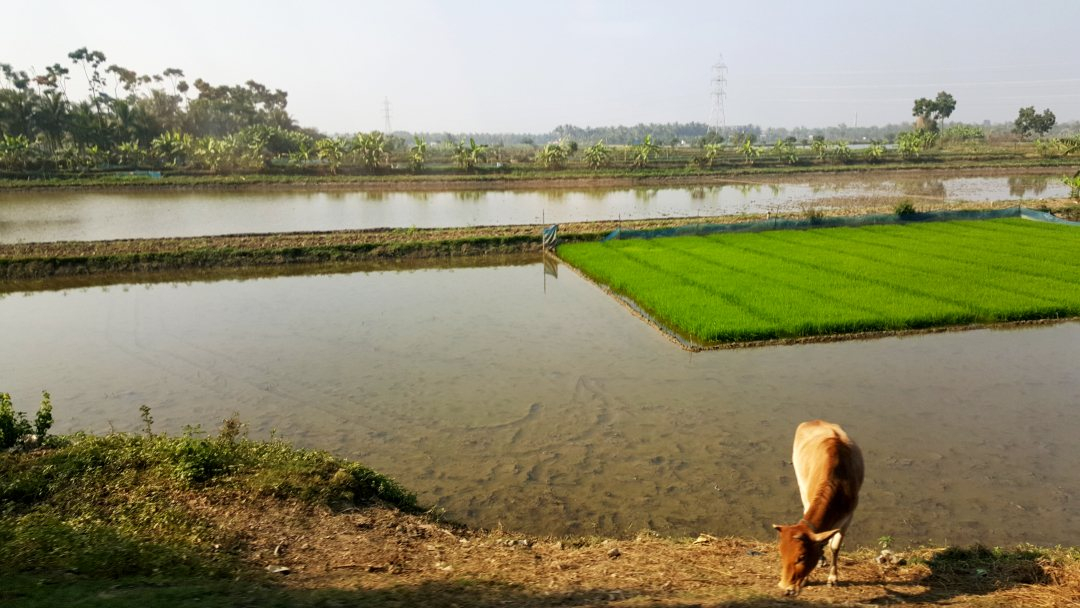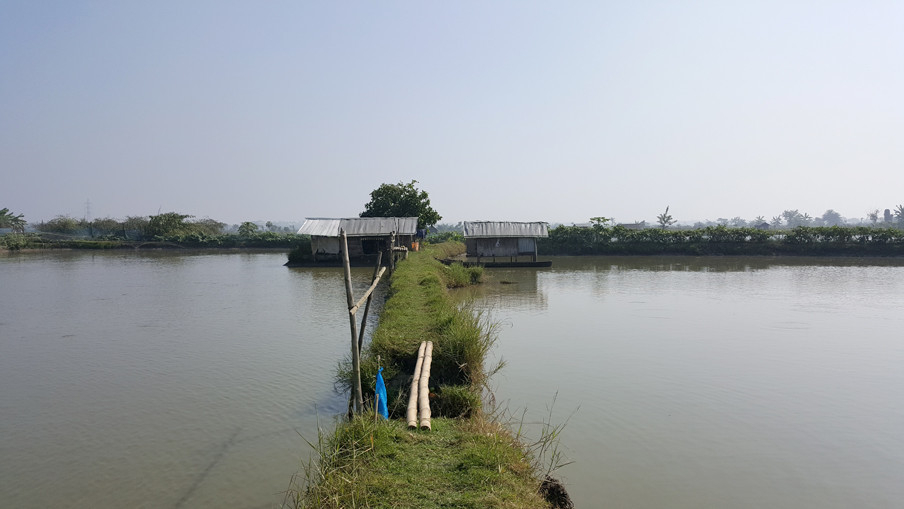How Bangladesh is dealing with a water crisis

Many low-lying countries are under threat from the effects of climate change. In Bangladesh, the problems are regular cyclones and rising saltwater from the Bay of Bengal to the south, as well as annual flooding from the Himalayas in the north. Delta expert and publicist Joep Janssen travelled to the vulnerable country to see how his home country of the Netherlands is collaborating with the Bangladeshi government to formulate an ambitious delta plan.
Abdur and Abdul Gain are standing in lungi outside their homes, surveying the vegetable garden and bald fruit trees that were decimated by seawater during flooding last year.
Both men live in Chandghar, a village which lies on a polder 160 kilometres south of Dhaka. After the flood, they had to leave their home and land. Now they live in a hut on an embankment, made of bamboo and plastic.
Bangladesh has 139 polders. They were created with the help of Dutch development money in the 1960s and 1970s to protect around nine million farmers from flooding and salinisation. That number is comparable to the population of Dutch people who live in areas that risk flooding if they are not defended properly.
Like Bangladesh, the Netherlands is also a flat, delta country. The Bangladeshi delta is wedged between the Himalaya and the sea, and is formed by the confluence of the Brahmaputra, Ganges and Meghna. These rivers supply fertile sediment for agriculture, but they also bring flooding and embankment erosion. Without dikes, a large part of the country becomes submerged during the rainy season.
But now, the polders are themselves under pressure from the process of sand deposition. "They have become ponds," explains climate expert Atiq Rahman.


Human pressure is more impactful. Bangladesh, with a population of 160 million people, is growing by two million inhabitants per year. "They all want food and a roof over their heads, but that's a huge task in a delta in which the water and land merge in to each other smoothly," says Atiq.
He is optimistic, because like the delta, Bangladeshis are dynamic and resilient - thousands of coastal residents are forced to relocate several times in their lifetimes and so they are accustomed to creating new homes elsewhere.
Due to global warming, Bangladeshis are further put to the test. Tropical cyclones are occurring more often and becoming more intense, average temperatures have risen by 0.65 degrees Celsius in the last 60 years, and the mean annual rainfall has increased by 10 percent.
Atiq Rahman predicts that millions of people in the country will be displaced if sea levels rise by one metre. And as the water rises, the salt penetrates deeper inland, which adversely affects agriculture and the food supply.

Dutch experts to help Bangladesh
In order to repel the three-pronged danger of population pressure, saltwater and climate change, Dutch companies and knowledge institutes are on hand to work with Bangladesh. This time with the Bangladesh Delta Plan 2100, a long-term vision for water and food security, economic growth and sustainable development that should better equip the country to deal with natural disasters and climate change.
The Bangladesh Delta Plan 2100 is now ready for approval by the Bangladeshi government. A consortium led by Netherlands-based consultancy agency Twynstra Gudde is guiding the process, with financial assistance from the Dutch government.
So far, the plan has been well received
So far, the plan has been well received. The Bangladesh government is decisive - in a short time all stakeholders have been consulted and the Delta Plan has been adopted in the national, so-called five-year plan.
Following a blueprint common in the Netherlands, a Delta Commissioner will determine and implement the Delta Programme annually, with support from a Delta Fund which has ambitiously allocated 4 billion euros per year until 2050. There are 150 projects currently under review by the World Bank, which was involved in planning at an early stage.
The large-scale plan has come in for some criticism as well, however. According to some experts, Bangladesh leans too much on the input of foreign consultants, seeking to take positions in the country. In addition, a lack of money and time means only existing knowledge has been brought together with no new research developed, which would make the quality of the basic studies too low. Finally, some Dutch experts raise the question of whether the Delta Plan has become too much of an engineering plan, insufficiently connected to the environment.

Moving from planning to success
One of the Dutch experts involved in the Delta Plan 2100 is Catharien Terwisscha van Scheltinga, researcher on climate adaptation and water management at Wageningen University and Research Centre in the Netherlands. She is able to draw on her experience at home when considering the tangible steps Bangladesh should take to implement the plan.
"In a country that grew up with five-year plans, it's easier to take a decision about the plan at a high level than to actually get it off the ground," she says.
Catharien says the Bangladesh government has already started implementing the plan through improved coordination and collaboration between finance, projects, and institutions such as the World Bank, foreign governments, and non-governmental organisations (NGOs).
"But it doesn't solve the water issues in delta areas; a successful approach requires a government strategy that is linked to the local people's tactics, and intertwined with local culture, history and interests," she says.
In other words, the Bangladesh government must not only develop new projects, but also target existing good practices towards the long-term goals of the Delta Plan.

The Blue Gold Programme, for example, helps farmers in polder areas to boost agricultural productivity and profitability through training on improved agronomic practices, value chain development, and effective water management. This is being achieved through a combination of actions: hard interventions such as sluices and elevating dikes; soft interventions including the introduction of improved rice varieties; and education for farmers.
"The Delta Plan is not about infrastructure only," Catharien adds. "We also need to invest in the culture of dialogue and development of knowledge, for example on subsidence and sand deposits. This is extremely important, because the large amount of sediments that flow from the river into the sea can be used for land reclamation, thus creating a buffer against sea level rise."
Handy, because Bangladesh needs new land. However, the researcher believes it has to be a broad dialogue and debate on reclamation, so that people will not regret a hundred years from now.
"Looking at it from a Dutch private sector interest, we are eager to participate in this process because our water sector has extensive experience on dredging techniques. However, we have to make sure that we don't push Bangladesh into the Delta Plan in a Dutch way. It must be designed for and owned by Bangladesh," Catharien says.


Lessons to be learned
This should be an important driving force behind the elaboration of plans for all those threatened delta areas in the world – giving hope and a new future to people who cannot escape the cycle of poverty.
In other words, do not make plans to earn money from the Bangladesh delta, but take the responsibility to change people's lives for the better.
The story relates yet another lesson. From above, the Netherlands looks harmonious and orderly, while the river delta and decision-making process of Bangladesh can be characterised as dynamic and informal. This will be very helpful in emergency situations, like during a cyclone, when Bangladeshis are at their best; they can quickly mobilise village communities into taking immediate action.
"We fish and live one day at a time," explains Abdur Gain as he overlooks the river. "On the other side, they are building a new village, because of sediments that have been deposited by the flow. Maybe we'll move there."
This story was first published on The Correspondent and The Daily Star






Member discussion